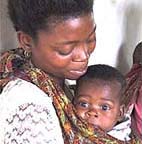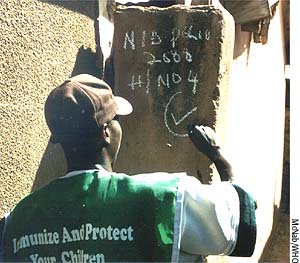|
||||

|
|
||||||||||
|
November 2000 Return to November 2000 contents page NEWS Early gains in Africa’s ‘biggest ever’ attack on polio IN the largest synchronized peacetime operation the region has ever seen, 17 countries in West and Central Africa have begun a campaign to immunize 70 million children against polio. With the second round due to start in late November, the early results from the first round, conducted during October, indicate that the campaign has reached a higher proportion of children than any before it.
The organizers also targeted national borders, where migrants and victims of conflict tend to miss out on polio immunization. "These synchronized campaigns are an opportunity for peace-building," said Carl Tinstman, UNICEF’s senior advisor for polio eradication. Despite the success, there is still room for improvement, said Nshimirimana. "We still have villages that were not covered in hard-to-reach areas, and we need to do more to train some of the volunteers." A third round will follow early next year in some countries. The success of a coordinated and synchronized cross-border campaign could be adapted for other public health purposes, said Aylward, including malaria control or even anti-smoking programmes. The countries involved are: Benin, Burkina Faso, Cameroon, Chad, Côte d’Ivoire, Gambia, Ghana, Guinea, Guinea Bissau, Liberia, Mali, Mauritania, Niger, Nigeria, Senegal, Sierra Leone and Togo. Key to the effort is Nigeria, the largest remaining reservoir of endemic polio in the region. Phyllida Brown
Return to November 2000 contents page
|
||||||||||
| Contact GAVI | Guestbook | Text version | Credits and Copyright
|
||||||||||

